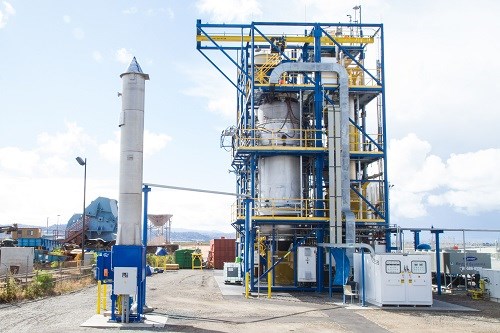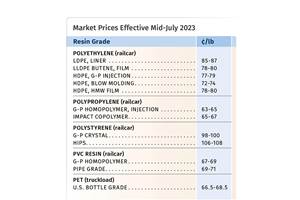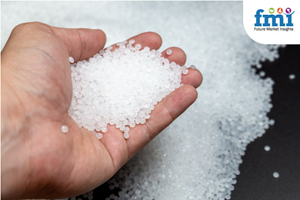'Clean, Sustainable' Carbon Black Production On Our Shores
Monolith's carbon black process, which uses natural gas as feedstock, will now be applied to a full-scale manufacturing facility in Nebraska.

Throughout most of the 20th century, North America was the leading producer of carbon black. By 2012, North American capacity had dropped to a mere 12% of the global capacity, while China’s had risen to 38%. One company is looking to shift the production of carbon black from being less reliant on the utilization of petroleum oil; first, in the domestic market and then globally. In fact, Monolith Materials (formerly Boxer Industries) believes that its proprietary process technology has the potential to reestablish North America as the leading global producer of carbon black.
The Redwood City, California firm produces both standard ASTM grades of carbon black as well as highly customized performance grades for a broad range of applications. In plastics alone, these range from colorants in consumer and industrial goods to UV absorbers in pipe and agricultural films to electrically conductive grades used in electrical cables and various components of high-volume consumer electronics. Carbon blacks have long been used as reinforcing agents and fillers in tires and other rubber products, batteries, and as pigments in inks, paints and toner.
Monolith uses natural gas as feedstock in its process instead of crude oil or coal-tar as in conventional processes. Since mid-2014, the company has been operating a pilot plant using its technology to convert pipeline grade natural gas using grid electricity into valuable carbon black and hydrogen. Located at its Redwood City site, the Seaport Plant serves as Monolith’s industrial demonstration facility and represents the first new carbon black plant to be permitted and build in the U.S. in the past 30 years, because of environmental regulations. On-site lab facilities also allow for grade evaluation and tuning, as well as ongoing applications development.
As noted above, a coproduct of Monolith’s manufacturing process is plentiful hydrogen. This valuable industrial gas is used in a range of industries including petroleum refining, clean-power generation, and chemicals. It was this that led to Monolith establishing what appears to be a first-of-its-kind partnership with the Nebraska Public Power District (NPPD), Nebraska’s largest electric utility. NPPD plans to replace an existing coal-fired boiler at its Sheldon Station plant in Hallam, Nebraska with one that will use hydrogen, produced by Monolith’s new full-scale carbon black manufacturing facility, to generate electricity.
Construction of Monolith’s facility is commencing this year, with initial production capacity scheduled online in 2016, and full production capacity on line in 2019. It is being build adjacent to the Sheldon Station so NPPD can easily access the hydrogen. When burned, the hydrogen fuel produces zero greenhouse gas emissions. Through this collaborative project, NPPD is expected to reduce CO2 emissions at Sheldon Station by 1.1 million tons/yr. The new boiler, using hydrogen as a fuel, will continue to be capable of generating 125 megawatts of electricity for NPPD’s customers. The conversion is also expected to result in a dramatic reduction in other types of air emissions, and also aid in NPPD’s maintaining service as a low-cost energy producer.
The facility will result in hundreds of new high-tech manufacturing jobs in that region. In their joint announcement, Pat Pope, president and CEO of NPPD noted that the Sheldon Station has always been “a place of firsts”—the first nuclear plant in Nebraska and now the first utility-scale hydrogen powered generator. Said Monolith’s co-founder and CCO Robert Hanson, “Together, Monolith and NPPD are helping reduce pollution, while still adding jobs and maintaining energy production. Additionally, Monolith is bringing the first cleanly made carbon black plant to the U.S., which will help our country grow this important industry and expand America’s manufacturing economy.”
Related Content
PS Prices Plunge, Others Appear to Be Bottoming Out
PS prices to see significant drop, with some potential for a modest downward path for others.
Read MoreNova Makes Senior Leadership Changes
The company’s aim is to bolster sustainability ambitions
Read MoreArchitectural Mesh Made from Covestro’s Bioattributed PC
Kaynemaile’s new RE8 Architectural Mesh will deliver an ISCC Plus certified sustainable share of up to 88% of its architectural product.
Read MorePlastic Compounding Market to Outpace Metal & Alloy Market Growth
Study shows the plastic compounding process is being used to boost electrical properties and UV resistance while custom compounding is increasingly being used to achieve high-performance in plastic-based goods.
Read MoreRead Next
People 4.0 – How to Get Buy-In from Your Staff for Industry 4.0 Systems
Implementing a production monitoring system as the foundation of a ‘smart factory’ is about integrating people with new technology as much as it is about integrating machines and computers. Here are tips from a company that has gone through the process.
Read MoreFor PLASTICS' CEO Seaholm, NPE to Shine Light on Sustainability Successes
With advocacy, communication and sustainability as three main pillars, Seaholm leads a trade association to NPE that ‘is more active today than we have ever been.’
Read More























